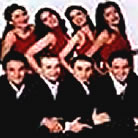August 29, 2003
(cairolive.com) For the
first time an Egyptian film is going to the Oscars. That’s the
sound bite. The fine print is that Sahar El-Layaly — the “hottest
film of the summer” — will have to compete with at least 50
other films entered in the US Academy of Motion Picture Arts and
Sciences Best Foreign Film category for 2003.
On Tuesday afternoon a
committee meeting at the Ministry of Culture’s offices in
Dokki decided to nominate the film as Egypt’s official entry
to the Oscars, a decision that looks set to catapult Sahar El-Layaly
to ever greater heights of hype.
Chaired by veteran
journalist Kamel El-Zohairi, and including actor Mahmoud Yassin,
actress and producer Isaad Younis, scriptwriter Rafik El-Sabban,
director Samir Seif and critic Ahmed Saleh among others, the
committee — unusually for such a gathering of “elders” —
seemed happy to push this youth-dominated pop culture product.
 According
to the committee’s statement the film was chosen because of
“its new and daring ideas and opinions,” the “sophisticated
cinematic language used to express human sentiments” and “the
simple performances from its actors.”
According
to the committee’s statement the film was chosen because of
“its new and daring ideas and opinions,” the “sophisticated
cinematic language used to express human sentiments” and “the
simple performances from its actors.”
Buoyed by the
announcement the film’s director, Hany Khalifa, told the
Weekly that he is not overly concerned about the film’s
chances of making it to the competition’s final round. “I
don’t know what they are expecting from a film from this
region. Our film is not political. I don’t know if a Western
mentality will accept that.” Khalifa said it was enough for
him the film resonated with local audiences.
Committee member Yassin
told the Weekly that “the committee did not expressly take
into consideration what Western audiences wanted to see.”
That, he argued, would have involved adopting a “cowboy
mentality’.
Egypt was invited to
submit a film by the Academy’s Executive Director Bruce Davis,
who asked Cairo Film Festival President Cherif El-Shoubashi to
form a committee to choose the Egyptian entry. El-Shoubashi is
realistic about this particular film – or any Egyptian film’s
— chances. He hopes, however, “that it will get people in
the cinema industry thinking. Here’s this door that’s been
opened, this high level space that we’ve got to fill. Let’s
work towards doing that.”
The committee looked at
23 films released since November 2002. In the end it boiled down
to a choice between Sahar El-Layaly and Ma’ali Al-Wazir,
starring Ahmed Zaki, a surreal exploration of a corrupt minister’s
conscience.
Only five foreign films
eventually make it to the finals in the category. In general
these are films that have won major international prizes.
According to the BBC films from 54 countries will be forwarded
to Academy members this year. Not always the most popular film
in any given country the criteria that goes into their selection
is often confusing.
There are also issues of
subtitling and translation, particularly given one of Sahar El-Layaly’s
main selling points is that it’s so real, so slang, so the way
shabab actually talk on the (well-paved) street.
France and Italy have won
the lion’s share of awards since the prize was established in
1948. Last year the German film Nowhere in Africa beat
competitors from Finland, China, Mexico and the Netherlands. The
only Arab or African wins were Algeria in 1969 with Z, and Black
and White in Color from Ivory Coast in 1976.
An Oscar speculation
website is backing films from Argentina, Canada, India, Italy
and Norway as this year’s favorites.
Whatever the eventual
outcome Sahar El-Layaly has already received a lot of publicity
in the Western press. Everyone from the BBC to E-women’s news
have done stories, relating the film to social trends like
greater liberalism and religiosity. Rumour has it the Hollywood
Reporter was interested in doing a story on the film even before
the selection was announced. But the articles are usually
written by correspondents in Cairo who live and breathe the same
air that’s portrayed so realistically by the film — at least
for the two per cent of the population that holds their children’s
birthday parties at places like Appleby’s on the Nile.
But will the Oscar
committee and potential American and global audiences be
impressed by these modern lifestyles, pleasantly surprised that
Cairo is not all citadels and camels? Was this part of the film’s
attraction, the image of Egypt the committee wanted to offer? Or
will they be bored? After all, most cultural products that
successfully cross borders embrace the exotic rather than the
ordinary.
Khalifa thinks the
committee may have chosen the film because it shows a new
generation talking about their problems. It’s fresh, he says.
“It’s a human story that could take place anywhere and art
should be like that.”
The chosen film’s
ordinariness, though, has been a point of contention among local
audiences.
“It’s not that it’s
a great film,” is how 33-year-old Hisham summed it up. “It’s
just that there’s nothing else out there, and it’s a decent,
well-made, interesting film that deals with a serious topic
rather than just dumb comedy like everything else out there, so
it stands out. But alone it’s not wow.”
Wael, Hisham’s friend,
is more enthusiastic. “It’s one of the best films in the
history of Egyptian cinema. The dialogue is so real. You feel
like it’s your life.”
Image appears to have
caught up with reality as the Sahar El-Layaly effect has crept
into life in many ways — via ads and video clips that fill the
yawning gap that used to exist between the speed at which
society is changing and the reflection of that change in popular
culture — the pixilated reflection of the many things with
which we fill our days.